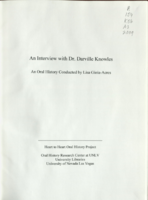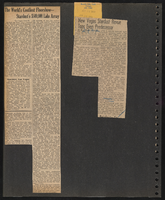Search the Special Collections and Archives Portal
Search Results

Ruth J. Kiley interview, January 24, 2013: transcript
Date
Archival Collection
Description
Rancho High School. Moved to Las Vegas in 1957 when she was thirteen. Ruth graduated from Rancho High School and worked with a variety of unions and casinos on their insurance claims
Text

Ace Daniels interview, June 2019: transcript
Date
Archival Collection
Description
Interviewed by Monserrath Hernández and Rodrigo Vazquez. Born (1985) and raised in Nevada, Ace is the Senior Conference Sales Manager at Wynn and Encore. His parents immigrated from Dominican Republic and are casino dealers. Ace is a UNLV graduate with degrees in Business and in Theatre Arts. Enthusiastic support of local theatre arts, he is active with the Super Summer Theatre Advisory Board. Married to Raul Daniels.
Text

Transcript of interview with Dr. Darville Knowles by Lisa Gioia-Acres, October 9, 2008 and November 9, 2008
Date
Archival Collection
Description
Dr. Darville Knowles was born in Miami, Florida, in 1948. His mother and father were schoolteachers in Dade County. After their divorce in 1962, Darville's mother relocated to Las Vegas with her two sons and took a teaching position here. Dr. Knowles comments on the differences between Miami and Las Vegas as far as segregation regarding housing, education, and job opportunities. He also mentions that his grandmother had emigrated from the Bahamas and that she impressed on them to make their own situation and community better. He recalls that track and field athletics were desegregated before the contact sports, such as football and basketball. Darville and his brother Michael (a lawyer in Miami) both graduated from college. Darville attended Howard University and Stanford University Medical School and completed his internship at the Jewish Hospital of St. Louis. Dan Wilkes, a family friend and pathologist in Las Vegas, convinced Darville to look at Las Vegas for job opportunities. After trying St. Louis, Atlanta, Houston, and Los Angeles, Dr. Knowles finally settled in Las Vegas in 1982 and "grew' his practice at Sunrise Hospital. Dr. Knowles comments on health problems in Las Vegas related to eating choices, lack of exercise, and poor air quality. He describes how HMOs have changed the practice of medicine and gives his opinions on how health care should be addressed by Congress. He also discusses the future of medicine, the research he was involved in, and the AIDS crisis. Dr. Knowles talks about how medicine has changed since 1982, the large number of respiratory problems that he treats, and comments further on HMOs and the fixture of medicine in Las Vegas. He also shares that he found time to author a murder mystery and has plans to write more.
Text

Transcript of interview with Otto Merida by Claytee White, May 18, 2017
Date
Archival Collection
Description
When looking back on his legacy in the Latinx community of Las Vegas, Otto Merida (1945 - ) takes great pride in being a Latin Chamber of Commerce [LCC] co-founder with Arturo Cambeiro. With the LCC, they forged a powerful economic entity that continues to provide the local Latino community with social and political influence. Growing up during the 1950s in Havana, Otto Merida fondly remembers his childhood despite living under the dictatorship of Fulgencio Batista. There were the murmuring sounds of explosions from afar on the way to baseball games, but also the warm Sunday family meals of Cuban soup with fideos. In this interview, he talks about the rising communist powers inspired by revolutionary Fidel Castro and the events that led his family to place him in the Peter Pan Program in 1961. The Peter Pan Program sent unaccompanied Cuban children to the United States to avoid potential instruction by Castro’s government. Merida still holds on to his mother’s final request upon leaving Cuba-“I want you to remember the address where we live and the phone number: Josefina 68-entre primera y segunda-La Víbora, Havana con el teléfono X4304.” As a part of the Peter Pan Program, Merida experienced a nomadic childhood living in barracks in Miami and a three-story home in Wilmington, DE. The only connection he had to his family were a series of letters he exchanged with his mother, until they reunited years later in Miami. For Merida, life on 79th Street and Biscayne Boulevard in Miami was defined by the values of his family and other Cubans and African Americans in his neighborhood. v Merida earned his bachelor’s degree in Political Science from the University of Florida. He credits his sister-in-law with a pivotal role in his decision to pursue a higher education. His engagement in politics continued through his involvement with the Cuban Circle, the first Hispanic community to be involved with politics in Las Vegas. He describes the migration of Cubans to the casino scene of Las Vegas and the presence of Cubans in the community. His work with the Cuban Circle inspired him to develop a political presence for Hispanics in the community. While travelling across the United States before settling in Las Vegas, Merida made many significant relationships while working with associations such as the Fitchburg Chamber of Commerce and Volunteers in Service to America [VISTA]. Living in Las Vegas, Otto Merida worked as an educator and community organizer. In the late 1970s, Merida and Arturo Cambeiro collaborated to create the Latin Chamber of Commerce of Las Vegas. For Merida, the Chamber consistently goes above and beyond the vision he and Cambeiro had created when they first opened their doors. From the creation of the Latino Youth Leadership Program at UNLV to their work alongside political figures such as Senator Catherine Cortez-Masto, Merida is extremely proud of the various accomplishments of the Chamber. Now as President Emeritus, Otto Merida continues to dedicate himself to the Chamber as a volunteer and serves as one of the many Latinx Voices of Southern Nevada that have shaped the greater Las Vegas community.
Text

Transcript of interview with Harry Kogan by Barbara Tabach, January 12, 2016
Date
Archival Collection
Description
With a liveliness of a man decades younger, Harry Kogan looks at his 100th birthday with cheer and satisfaction. Born March 11, 1916 to poor Russian immigrant parents in the Jewish ghetto of Philadelphia, Harry vividly recalls walking to school shoeless, with no hat or no raincoat. A treat would be his mother handing him ten-cents to go to the theater and enjoy a silent movie. After graduating from high school in 1933, Harry quickly took one of the rare jobs available in a garment manufacturing company where he worked his way into being a skilled and valued fabric cutter-a job that paid $35 a week. Harry was raised with two brothers and lived in Philadelphia for the first 91 years of his life before moving to Las Vegas. One of his brothers learned the refrigeration business while enlisted in the Navy and after the war formed a commercial refrigeration business named Kogan Brothers. Harry is a philosophical and philanthropic man. He was slow to retire and traveled the world, took classes and donated to his favorite causes; among which are the Boys Town Jerusalem and the Jewish Federation of Las Vegas. He sat for this interview to honor his Jewish roots, to share his life experiences and spending the past years in Las Vegas.
Text

Transcript of interview with Phyllis Friedman by Barbara Tabach, March 2, 2015
Date
Archival Collection
Description
In this interview, Phyllis Friedman reflects upon her extensive work with the ADL in Las Vegas. She discusses the city?s relatively low anti-Semitic activity, and how this allowed the Las Vegas ADL office to focus its efforts more broadly than in other cities. She also touches upon her family history, and how the community of Las Vegas has evolved since first visiting in 1963.
A Chicago native, Phyllis Friedman first came to Las Vegas in 1996 to become the Jewish Federation of Las Vegas? first foundation director. After two years, Friedman moved to year Los Angeles to work for ORT. Itching to get back to Las Vegas, in 2007, Friedman returned to the city to became director of the Nevada regional office of the Anti-Defamation League (ADL). In this position, she worked with schools as well as law enforcement, including the Federal Bureau of Investigation (FBI), teaching about tolerance and justice. She is a recipient of the FBI?s Las Vegas Division Director?s Community Leadership Award as well as the first awardee of Jewish Federation?s Jewish Professional of the Year. Three weeks into retirement, Friedman gave this interview, reflecting upon her extensive work with the ADL in Las Vegas. She discusses the city?s relatively low anti-Semitic activity, and how this allowed the Las Vegas ADL office to focus its efforts more broadly than in other cities. She also touches upon her family history, and how the community of Las Vegas has evolved since first visiting in 1963.
Text

Transcript of interview with Arne Rosencrantz by Barbara Tabach, February 18, 2015
Date
Archival Collection
Description
Arne Rosencrantz is the former president and owner of Garrett's Furniture in Las Vegas, Nevada. Rosencrantz was born on September 27, 1947 in Longview, Washington. He moved to Las Vegas in 1952 and attended Nevada Southern University, now known as the University of Nevada, Las Vegas (UNLV). In 1967, Rosencrantz began working at Garrett's Furniture, and in 1979, he purchased the company and became its president. He was president of the Jewish Federation of Las Vegas from 1987 to 1988, and also served as a campaign chairman for the Federation and chairman of its Young Leadership Program. In this interview, Rosencrantz shares his grandparents and father?s immigration story, which took them from Russian to Portland, Oregon. He also talks about moving to Las Vegas, his childhood experiences, especially within the Jewish community, and reflects on the growth of his family?s furniture business in the city. Rosencrantz has been highly involved in the Jewish community over the decades, including the Young Leadership Program, United Jewish Appeal, Temple Beth Sholom, and the Jewish Federation. He is married to Lynn Rosencrantz and has two children, Marcus and Amy.
Text

Interview with Roger Ray, October 29, 2005
Date
Archival Collection
Description
Text


